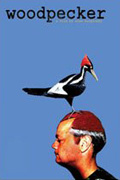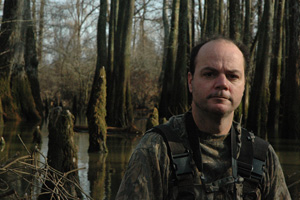
(Woodpecker is now available on DVD through Carnivalesque Films. Visit the film’s official website for more information.)
Alex Karpovsky’s follow-up to his clever debut feature The Hole Story is an even more accomplished and fully realized work of bittersweet existential docu-fiction. While many independent filmmakers continue to break new ground in the world of the fiction/non-fiction hybrid (two standouts from 2007 include Craig Zobel’s Great World of Sound and Zach Godshall’s Low and Behold), Karpovsky is carving his own unique path in his quest to find a truer, deeper state of cinematic being. As in The Hole Story, Woodpecker is equal parts television news report, American history lesson, probing documentary, and artificially constructed existential tragicomedy. More impressive than that, it works on both a universal and personal level as a statement of genuinely affecting edutainment.
In the opening reel, Karpovsky spins an engaging, heady blend of archival footage and present day interviews to explain just what is happening in the Arkansas bayou with regards to the supposed reemergence of the rare and exalted Ivory Billed Woodpecker. This deftly woven segment (by editor Eric Bruggemann) feels comprehensive, covering the area’s history, both natural and economic, with a brisk thoroughness that never becomes dry or overwhelming. At the same time, it explains how the presumably extinct Ivory Billed Woodpecker has provided a desperately needed surge to a particularly depressed American community. It does this using a strong dose of humor, but the laughs are not born out of mockery or condescension. What one gains from this is the firm sense that while Alex Karpovsky has a sharp comedic sense, he’s also dead serious in his appreciation for this particular story and the people in this town. By the time Woodpecker settles in with its protagonists, determined bird-watcher Johnny Neander (John E. Hearns) and his hilariously silent buddy, Wes (Wesley Yang), viewers have been sufficiently briefed and can give in completely to the drama of Neander’s own strange quest to spot the elusive woodpecker.
 Some people have an on-screen presence that cannot be denied. Jon E. Hearns is one of those people. The featured subject in Dominic DeJoseph’s documentary Johnny Berlin (and upcoming sequel Johnny Berlin Part 2: Notes From the Dumpster), Hearns has an extraordinary naturalism and command that cannot be taught. The man doesn’t have to do much to make us pay attention. Fortunately, he does much anyway, unleashing an endless torrent of witty, hysterical, profound, and ridiculous musings with undeniable sincerity. Karpovsky cast the naturally gifted Hearns to portray his hero, and while the film would almost certainly have worked with another individual playing the lead role, there’s no way in hell it would have worked like this.
Some people have an on-screen presence that cannot be denied. Jon E. Hearns is one of those people. The featured subject in Dominic DeJoseph’s documentary Johnny Berlin (and upcoming sequel Johnny Berlin Part 2: Notes From the Dumpster), Hearns has an extraordinary naturalism and command that cannot be taught. The man doesn’t have to do much to make us pay attention. Fortunately, he does much anyway, unleashing an endless torrent of witty, hysterical, profound, and ridiculous musings with undeniable sincerity. Karpovsky cast the naturally gifted Hearns to portray his hero, and while the film would almost certainly have worked with another individual playing the lead role, there’s no way in hell it would have worked like this.
As with The Hole Story, what begins as a breezy, casual portrait of a bizarre incident in a small American town becomes something much more profound. Karpovsky’s commitment to blurring the line between fiction and non-fiction is also expressed in his inherent ability to blur the line between comedy and drama. Hearns is the perfect choice to bring this vision to life. It is a deceptively stunning performance, one that gradually sneaks up on you and affects you more deeply than you would have ever predicted. While watching Hearns, I couldn’t help but think of Bill Murray, but I also had the genuine thought that Bill Murray has never been this good. A bold statement, perhaps, but watch Woodpecker and consider the range of emotions expressed by Hearns—not to mention his knack for outright humor—and tell me that I’m wrong. Has Bill Murray ever been this genuine?
One thing that isn’t immediately clear is if Karpovsky created this imaginative hybrid approach to filmmaking first, or if he found himself drawn to real life stories that were as much truth as they were lies and this, in turn, spawned his novel approach to storytelling. But that is neither there nor here. The fact remains that Alex Karpovsky has discovered a new way to explore real life on the fake screen, inserting invented characters into actual news stories in the real world in order to navigate that murky terrain where fact and fiction, and truth and lies, meet.
— Michael Tully











Pingback: Hammer to Nail » Blog Archive » TRUST US, THIS IS ALL MADE UP – The Mysterious Art of Exceptional Improv
Pingback: TRUST US, THIS IS ALL MADE UP – Hammer to Nail